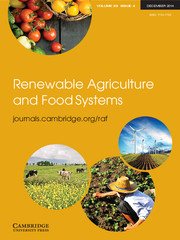Article contents
Effect of self-reported attitudes toward organic foods in consumer preferences and willingness to pay
Published online by Cambridge University Press: 22 February 2022
Abstract
Although consumers' interest in organic products has increased in recent years, the total demand for these products is still small in most countries. This mismatch between the positive perception of these products and their limited final demand is the so-called intention-behavior gap. The aim of this study is twofold. The first aim is to evaluate the effect of self-reported attitudes toward organic foods in the willingness to pay (WTP) for these products. Second, we analyze the effects of these self-reported attitudes in the final purchasing decision when consumers are asked to evaluate several food attributes simultaneously. The results show that self-reported attitudes toward organic products are useful predictors of higher WTP and can be arranged in different categories (range 15.2–20.1%). However, when a conjoint analysis of different food attributes was conducted, the segment of pro-organic consumers reported that the origin of the product was more important for them than the production system. This opens a new debate about the advisability of promoting the joint use of both labels (organic and origin labels) to engage pro-organic consumers.
Keywords
- Type
- Research Paper
- Information
- Copyright
- Copyright © The Author(s), 2022. Published by Cambridge University Press
References
- 4
- Cited by



